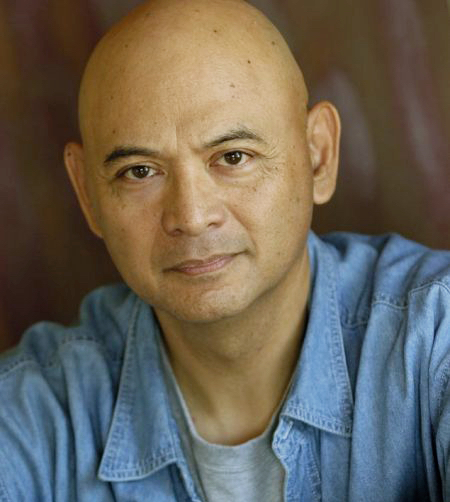Entretien avec
Domingo Magwili
Existe aussi en Version Française
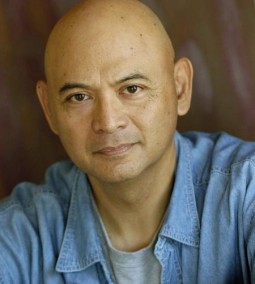
In the 1990’s and early 2000’s, Dom Magwili worked for Cine Excel Entertainment, writing, producing and/or directing colorful titles such as Future War, American Streetfighter, SWAT: Warhead One, Bikini Hotel, Power Elite, GiAnts, Internetrix, Magma, The Abominable, Reptilicant… He kindly took the time to share with us some stories about the making of those films, thus shedding light on the guerrilla-like methods of one of the tiniest and craziest independent production companies.
Interview conducted on May the 20th of 2021 by John Nada.
How did you meet Cine Excel’s boss David Huey?
I met David Huey by way of my wife. In 1989, David Huey and Jerold Chan did a production called Black Forest a.k.a. Hyper Space, a low-budget science-fiction piece. My wife Sachiko got on board as an assistant to Jerold Chan. She cooked food for the cast, called and acquired flatbed trucks, that sort of thing. After that experience, we maintained a working relationship with David Huey.
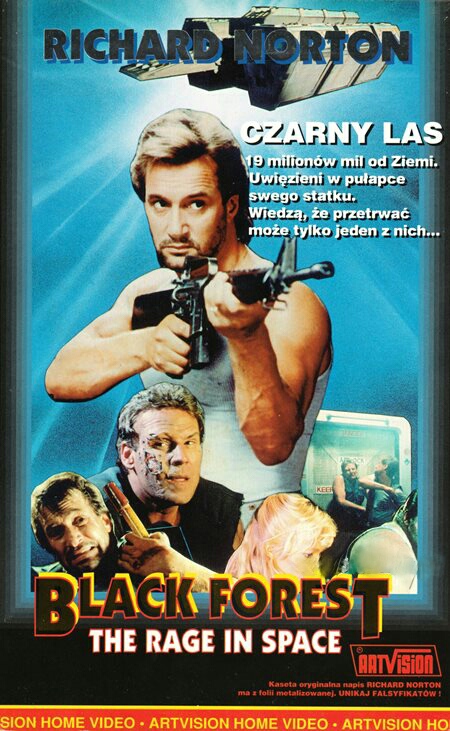 Black Forest a.k.a. Hyper Space (1989), written and directed by David Huey, starring Richard Norton, produced by Jerold Chan, David Huey and K.Y. Lim (head of the Filipino Cie Silver Star / Kinavesa).
Black Forest a.k.a. Hyper Space (1989), written and directed by David Huey, starring Richard Norton, produced by Jerold Chan, David Huey and K.Y. Lim (head of the Filipino Cie Silver Star / Kinavesa).
My wife and I are both actors, we write stage plays. So, one day David Huey approached me to write screenplays for his company. The first one I wrote was American Streetfighter, the Gary Daniels' piece. It was the first time I ever got paid for a script, and even if it really wasn't much, it was an opportunity, it was a credit – and beside I enjoyed writing and the challenge of it. Then I believe I did Future War, and after that he used me on and off to either doctor screenplays, or write things from scratch. In all I wrote six screenplays for David, and then I was hired as a staff member of Cine Excel and joined the production team.
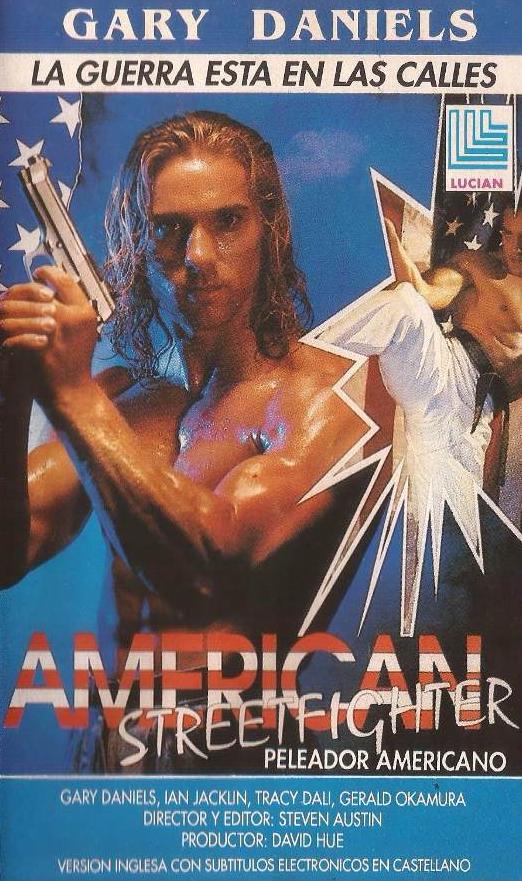
These scripts were usually influenced by whatever genre was popular at that time, and what would sell. How did it work? Did David Huey ask you to write scripts in a specific genre or topic?
When David had an idea or an assignment, we would go over to the Burbank Media Center, sit outside one of the outdoor restaurants and talk over the story. He would explain what he wanted, and we would together create a synopsis. Starting from an idea, we would develop the storyline, the narrative. And then, once that synopsis was completed, I would go off and write the full script.
David was a constant presence at the American Film Market. He was always around, so that the buyers of movies knew him. After a while, he became a veteran, just because of his recurring presence. And he would turn to the buyers and ask « what are you buying? » And sometimes they would say « dinosaurs and space aliens ». And so, he would come back, and within 6 months have a movie with dinosaurs and space aliens that he could sell to those buyers. That would be his style.
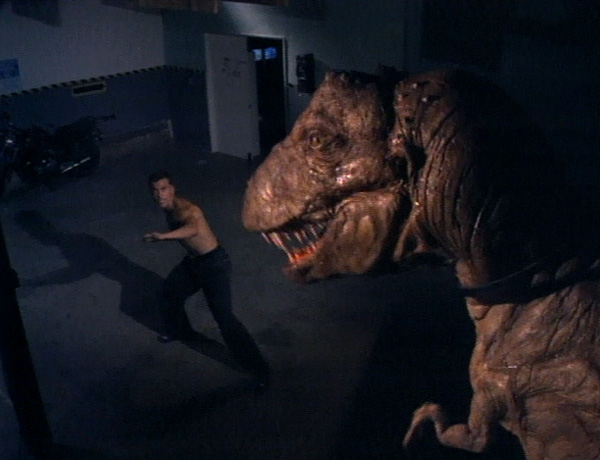 On the menu of Future War: dinosaurs…
On the menu of Future War: dinosaurs…
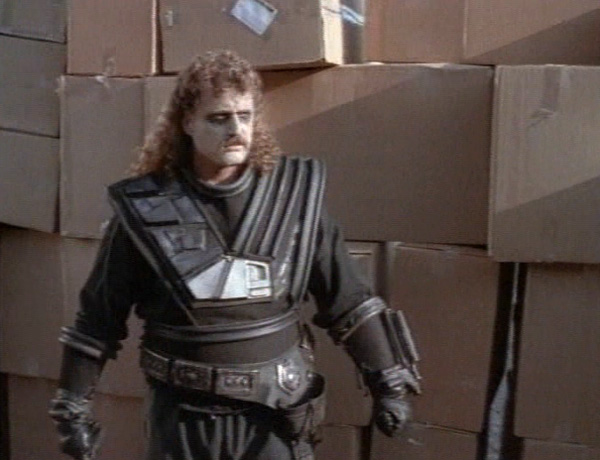 …and time-traveling cyborgs from outer space.
…and time-traveling cyborgs from outer space.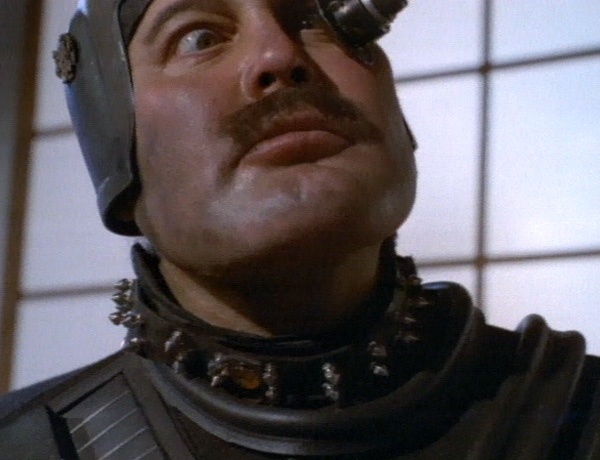 Jurassic Park & Terminator rolled into one movie.
Jurassic Park & Terminator rolled into one movie.
Usually his first step would be to make the movie, and then sell it. But I know on some occasions he also tried to pre-sell a film. For instance, I wrote another movie for him that would feature Gary Daniels. He would use it in the American Film Market, saying « Look, I have a script in hand, I have a star, I just need money ». But as far as I know, this movie project never materialized.
When you wrote those scripts, did you have to take into account that they would be produced on a very small budget?
No, David said « write as if you had unlimited budget ». And I said « Mmmh… OK ! ». So let’s get some spaceships coming down, all these dinosaurs, these space aliens… For Future War, I imagined a script that would need a budget like Steven Spielberg had. I had no idea of how David would reconstruct it to work for his particular production.
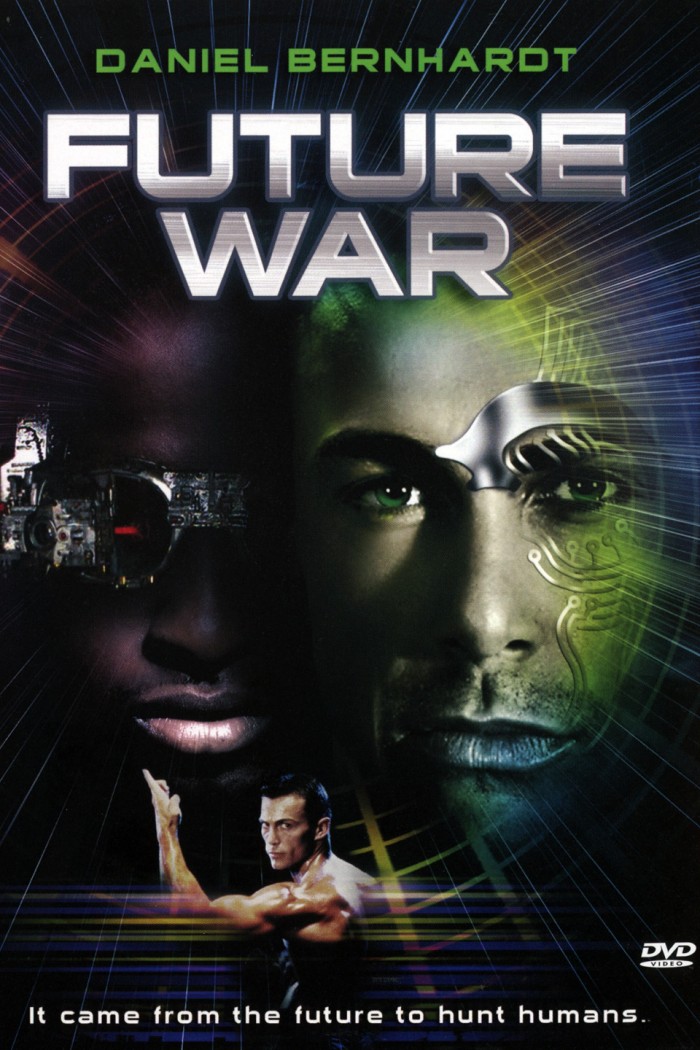
Cine Excel was one of many small, independent production companies, but they managed to stay in business longer than most. We would love to hear anything you can tell us about how the company operated, and what was their approach to making films.
Cine Excel films, they are what they are, and the harsh reality is that they are low-budget. There are young actors, and people who wished they were actors. There are people who will work for a reel and a meal. People who will work for free.
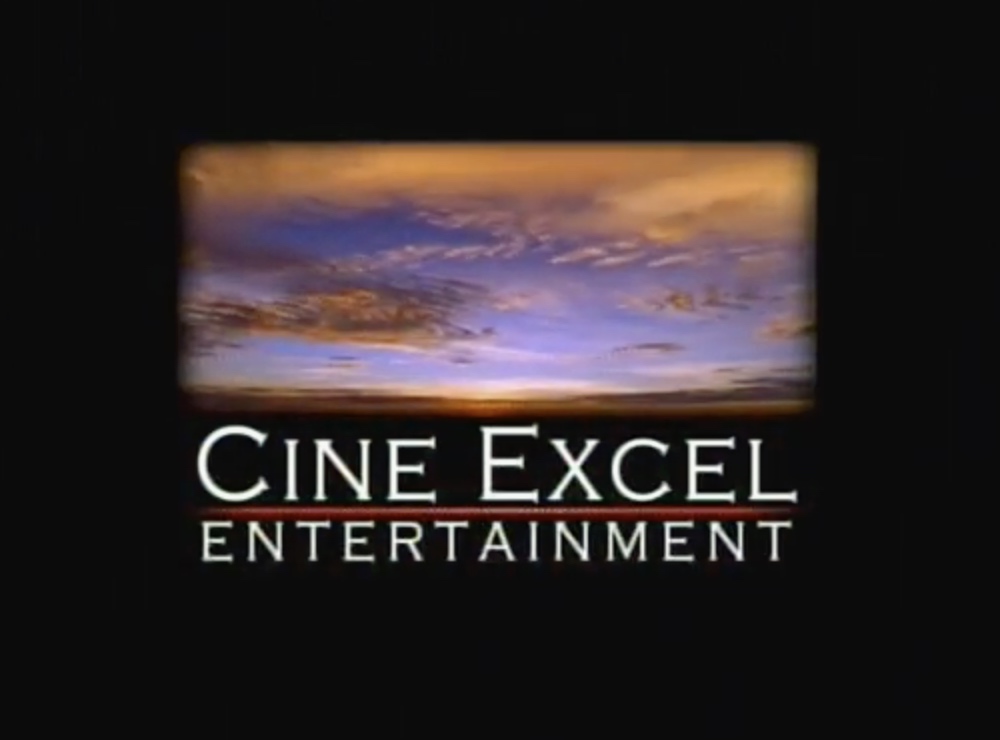
As an actor, I’ve worked on films and TV series with crews that looked like an army, with 12 to maybe 15 people, doing I don’t know how many things. At Cine Excel, we had the camera person, the sound person, and sometimes somebody who handled lights… and that was it. When I worked for David Huey, I didn’t know what the budget was, but we didn’t have trucks and trailers, none of us had fancy walky-talkies.
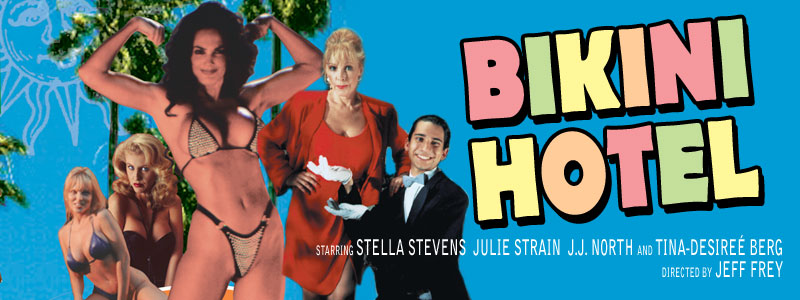
Whatever the film, whatever the size of the budget, the basics of film-making remain the same: you have the story, people behind the camera, and people in front of the camera. The quality of the equipment, crew and cast, that goes up and down. Hopefully you get the best that you can get. In the end you still try to tell a persuasive and enjoyable story. I don’t think it’s a question of budget, but a question of expertise and a certain level of cunning. You have to make the best of what you have. And that’s just what we tried to do with Cine Excel.
Most of the early Cine Excel movies seem to have been shot in this hangar-like structure, full of cardboard boxes and wooden pallets…
Yes, we often shot in this garage that David had in Redondo Beach. Picture a place that is used mostly to fix cars, like an auto repair shop. The open space, that was our sound stage. Our office was there too. Later we moved to El Segundo. [Nanarland: the last we heard, Cine Excel’s office had relocated again, this time in Gardena]
How did you get to direct Magma: Earth's Molten Core? Mel Novak told us « I passed on Magma, because of a director that was like Future War, and David fired him before filming started. »
As I recall it, there was nothing acrimonious or negative in the reasons of the director moving on. Patrick G. Donahue had just finished The Abominable and apparently the working situation was okay, but it just didn't work out. It was either schedule issue or he didn't understand the story, something like that. So, he dropped out, and then Dave looked at me and said « you want to do this? » and I said « yeah, sure ».
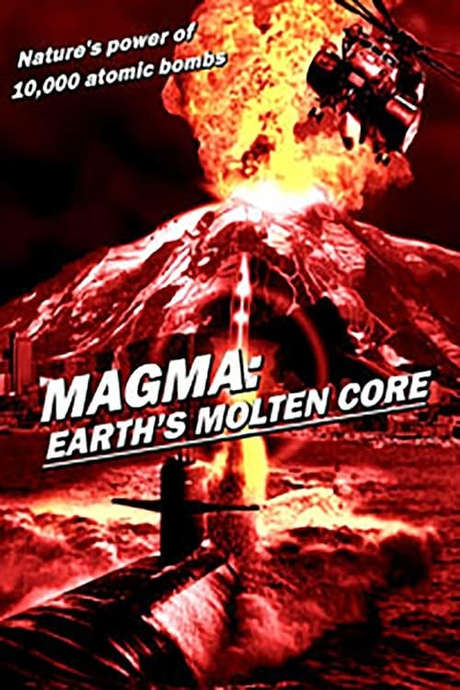
Magma tries to tell a story similar to blockbusters like Dante’s Peak and Volcano, but with only a very small fraction of the budget. How did you do it? What are the tricks?
I don’t know if there are tricks. The budget sort of dictates it. You find actors who need or want a lead role, and are willing to forego a salary so that they can have the experience and they can have the film credit.
Then you look at what you have and what you can steal. For example, there is a sequence in Magma where our heroes landed on a beach. Well, we shot on a beach, but we were not supposed to shoot on that beach. It was one of those « shoot it quick before we get found out », because we didn’t have a permit for it.
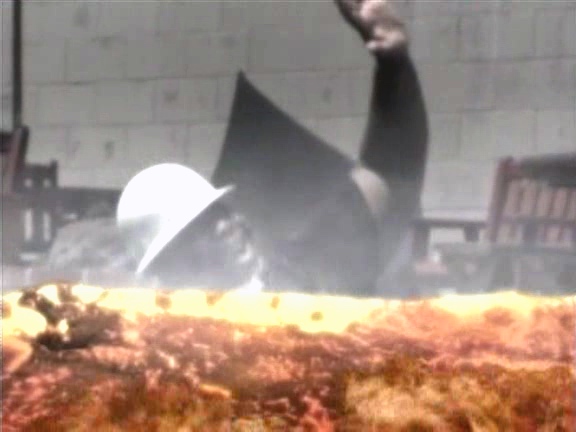
Then we had some level of computer-generated imagery. There was this female character whose body was to be swallowed up by a volcano. So, we made the actress sit on top of two folding dinner tables – one stacked on top of the other – and we shot it just so that we caught the top of her, and then she rolled off. And then the next shot was a CGI, it was the stick figure of a person falling into lava. And… that was our scene.
We also used a lot of stock footage – volcano eruptions, running lava, forest fires, building demolitions, Navy ships, some planes and helicopters too. And then you try to make it work in post-production, because the truth of making film is « sorry but that's the best shot we got, and what do you mean you don't have a cut away? We forgot! » so the editor is doing this, reverse the picture, insert a shot you only see for like one second, and if all goes well you eventually manage to make sense out of the chaos.
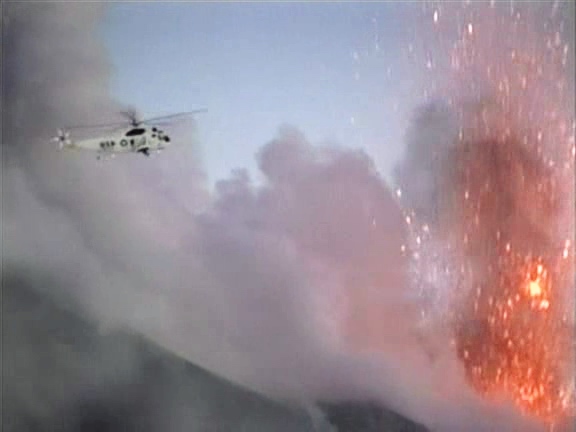
Did the cast really work for free on Cine Excel films?
Well, there are two levels. There is a level of people who perform – usually young actors who have tremendous talent, but have nothing – and are willing to work for next to nothing. « If you can give me footage and feed me, I’ll work for you. »
And there is also this element: there are people who just like movie-making at any level, they’re just like groupies to the whole project. They are retired or they have other sources of income, but they just want to be around that dynamic. There, you're tapping into « everybody wants to be in the movies ». Everybody wants to be Cary Grant or Robert De Niro, they all want the experience and the thrill of it. I mean look how many people make Youtube submissions all the time. They just want to have fun and be silly. Maybe it’s part of the human condition, I don't know, but people want to see themselves, and to be seen. They want to be famous on some level, even for 15 minutes.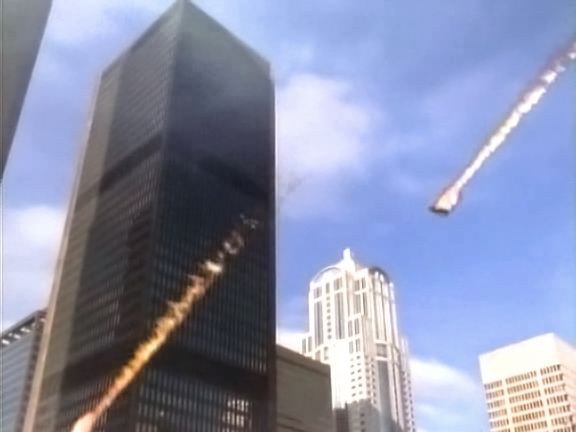
In Magma, there is a scene where Jason Scott Johnson makes a mistake, he fires on the wrong place and we do a shot of the victims. The extras we used happened to be members of a martial arts studio down in Oceanside, a city south of Los Angeles. It was 10 or 11 years old kids and their parents. They came up and became our dead bodies, covered in stuff. And then, later that evening, we were preparing for a shot. The scene was « the volcano is erupting and now the townspeople are running away », and so we used the same extras in their street clothes and told them « run, run! ». Everybody was running and acting as we needed, it was lovely.
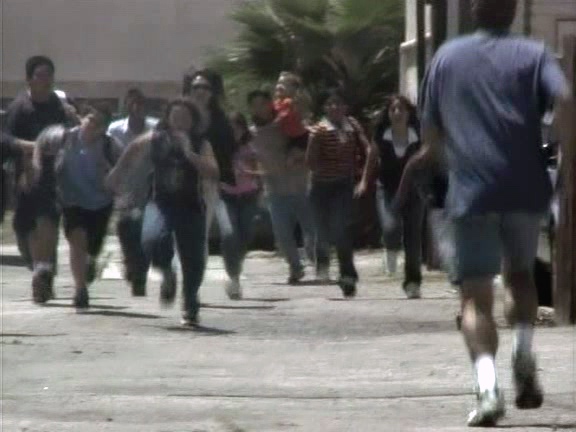 Let's note that the very same shot will later be re-used in The Abominable...
Let's note that the very same shot will later be re-used in The Abominable...
So the tricks on Cine Excel films were to have a viable story and credible enough computer graphics, and shoot it in 30 days, on the week-ends. Because everybody mostly worked during the day – they were bartenders, had office jobs – they wouldn’t be available till 4 or 5 in the afternoon. For Magma, I had young people in the main cast, 13 years old. We shot them in the summer, so we had access to them all day. We just could not work them more than 8 hours a day because of child labor laws, so we had to shoot them quickly.
Ron Hall had to do pretty much everything on Vampire Assassin, Mel Novak told us he was even cleaning up after cast and crew ate. Did you have the same kind of experience on Magma?
Certainly not to the same extent, because Vampire Assassin was mostly Ron’s effort. A one man film, really. He would knock on people’s doors and ask: « can I use your space to shoot a film? » And this is in Los Angeles, where a lot of the industry lives, and they are very jaded people. And yet, they want to participate, they want to be in the movies. And so they would say yes to Ron! That’s the magic: everybody wants to be in a film. Even if it’s backstage, or holding a boom mic, or walk across. In the film, the vampires were pretty much a variation on zombies, and they were just like people from the neighborhood who walked funny, but he managed to have quite a lot of them, and I don't know how he fed them, but again I think it does speak to how badly people want to be in the movies. Maybe a lot of people who would never be in the movies. But they dream of it.

And Ron Hall sold Vampire Assassin, he got it sold to Lionsgate! Not many of the things out of Cine Excel got sold, you know. I got a look at the DVD cover, there is this black guy with cornrows, in a trench coat and sunglasses, who has a sword… he looked nothing like Ron Hall! But of course that's what Cine Excel did: movies that look like other bigger movies. « You like Blade, you want some black guy who fights vampires? OK, we’ll get you one. »
So a low-budget film fills a need for people on many levels, there are those who participate and those who watch. Naturally, if you want to walk into Warner Brothers or Universal, then you're going to have to work on that level. And if you want to watch something more sophisticated, you'll have to pay the price. But at our modest level, as long as you had people willing to participate, and people who were buying, then it was cool making movies.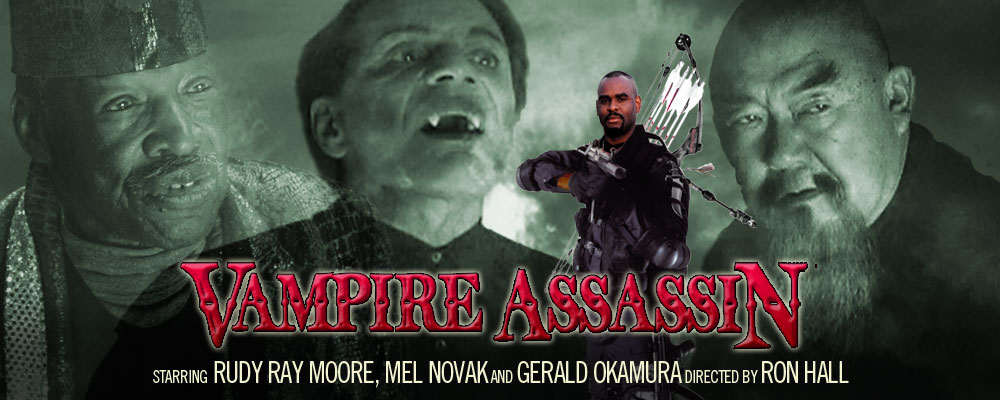
This may work for the cast, but what about the crew?
Well, most of the time, the core crew also happened to be the paid staff for Cine Excel. We were two permanent staff persons, the other being Ed Tillman [Nanarland: Ed Tillman worked on 16 films for Cine Excel between 1994 and 2012, mostly as cinematographer]. For us, Cine Excel was a steady job – I worked in the office, I would answer phones etc. Then you had people who were like hired-on for a project. So you have the director, who could also be the camera person + the sound person + the person who handles lights + me to handle everything backstage = 4 or 5 salaried employees, and that was our main crew. Everybody else came in because they wanted to begin in the movies, or just be part of a movie. We didn't need much more than that, because you don't need an army to make some films. Sometimes you need a lot of actors maybe, but as I explained, those were not too difficult to find.
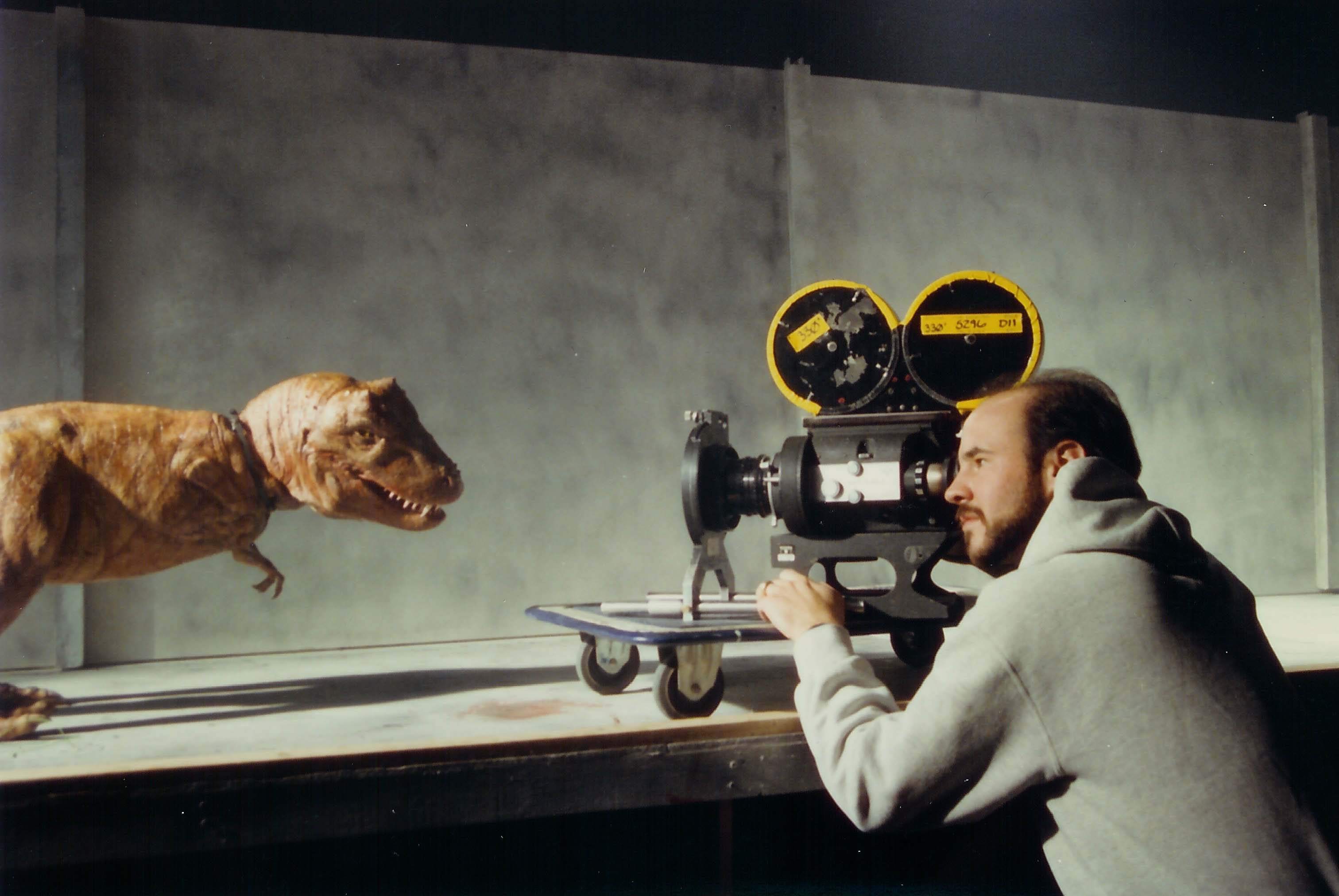 Director of photography Cory Geryak shooting dinosaurs' miniatures on the set of Future War. [Photo courtesy of Cory Geryak]
Director of photography Cory Geryak shooting dinosaurs' miniatures on the set of Future War. [Photo courtesy of Cory Geryak]
Among those people willing to work for next to nothing in order to get a first experience in the business, some actually managed to do well for themselves. After he started with Cine Excel, Jamil Nelson has been working steadily for television as an editor and motion designer. Cory Geryak started as a rookie cinematographer on Future War, and since then he’s been working on Mission: Impossible, Thor, The Dark Knight or Inception…
Absolutely. For some people who started there, like Gary Daniels, it’s embarrassing because they’ve done so much better since then. But it could be a good starting ramp. Daniel Bernhardt also made his debut with Cine Excel. He actually got on Future War because of Gary Daniels' experience with David. Daniel was hoping that he could also be fortunate in action adventure and martial arts films. And he did! [Nanarland: those last few years alone, Daniel Bernhardt did John Wick, Logan, Atomic Blonde, the TV Series Altered Carbon and The Matrix 4]
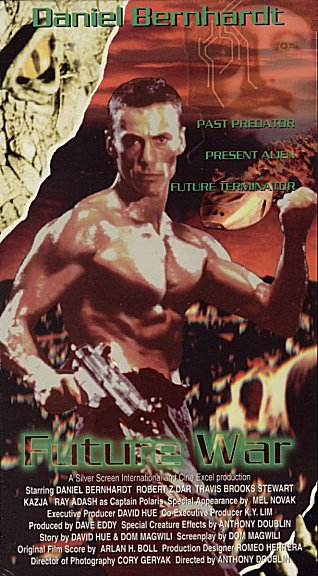
Do you remember Howard Cabalfin? He was the guy in the Yeti suit on The Abominable a.k.a. Ice Kong. Now he works at Digital Domain, supervising teams in Canada and India on big Marvel productions like Avengers, Spiderman, X-Men etc. And his very first experience in the film industry was with you!
That’s wonderful, I’m so pleased to hear it! Howard was a very good guy, I knew him when he was only that tall and was a student at UCLA. He lived next door to the garage we used to shoot our films, our sound stage. Also, he was very slim, he could fit into the suit – not many people could. We just got lucky with Howard, and he agreed to do it for a couple of times. It was really nice of him because after a while, that suit was very unpleasant. It was… odorous!
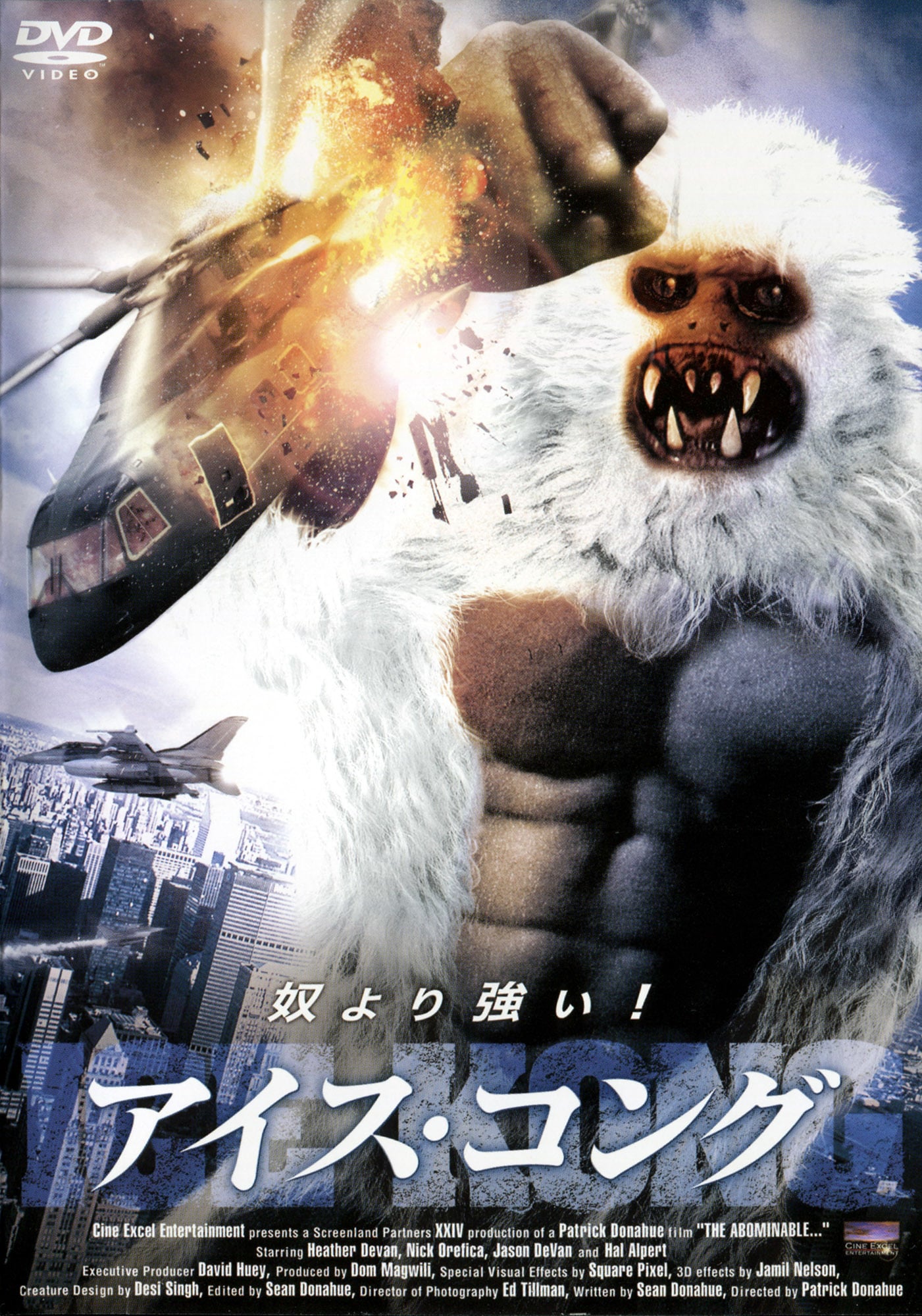 Japanese DVD cover for The Abominable a.k.a. Ice Kong (2006).
Japanese DVD cover for The Abominable a.k.a. Ice Kong (2006).
Speaking of The Abominable, budget is said to have been around $85,000, which is very little for a creature film like that. Was it the average budget for a Cine Excel production?
$85,000 to make The Abominable you say? Well, you know more than I do.
You didn’t know? But you are credited as Producer and Production Manager on this one…
I have no idea because I didn't handle contracts or budgetary stuff. In my years as a staff member of Cine Excel, even though I’m credited as producer, my job in production was more like a line producer. I mostly needed to handle craft services and food, shuffle around what costumes we had, scout locations, handle the schedules, and that sort of thing. I didn’t get into the money side because numbers were never a part of my job description. That was David’s.
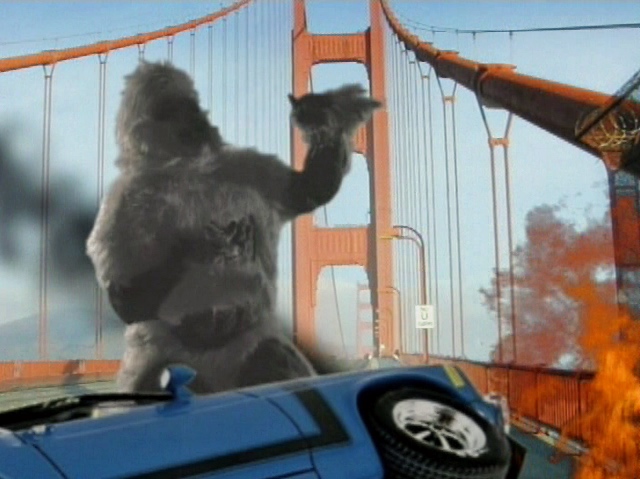
Actually I’m not surprised, because I’ve been told David Huey was very reluctant to disclose how much his movies actually cost. Even the directors were kept in the dark.
Yes, David kept a lot of that covert. He would fund it, and since he was paying for it, he expected to have the final word. So, he operated in that capacity as an executive producer.
You wrote the script for GiAnts. The film feels oddly disjointed, like it was two sets of footage cobbled together, with some footage shot on 35 mm and other on DVCAM. What happened?
Mel Novak shot a movie many years ago, something that had nothing to do with Cine Excel. He had film footage, but nothing came out of it, and it just sort of sat there. And Mel was trying to at least make some money back on it. So one day he brought all this footage to David and asked « how do we make a movie out of this? », and David had to find a way to reconstruct a whole new storyline around it. And David came up with the idea of giant ants. It is silly, and funny, but that was part of David’s cunningness. He was always very ingenious and resourceful.
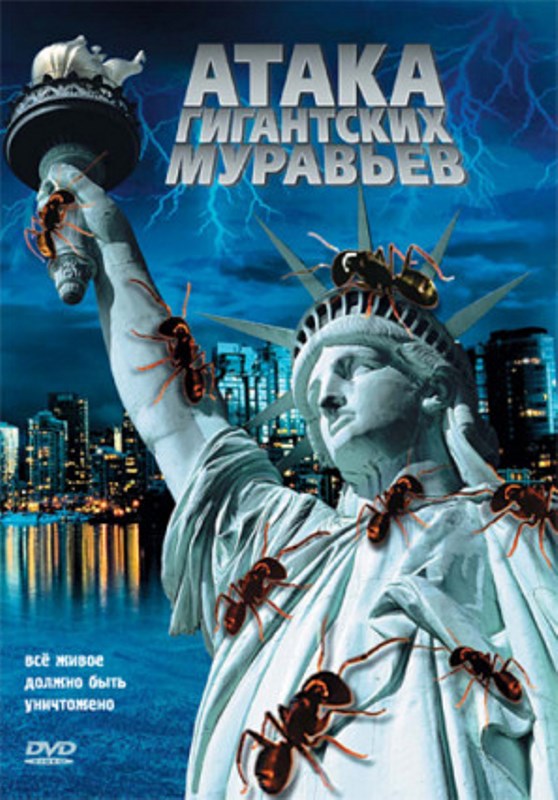
David Huey is credited for directing additional scenes on Future War, Pocket Ninjas, Reptilicant, and a few other titles. In fact it seems it was nearly the norm on Cine Excel films to have additional shootings made after the post-production already started. How come?
In the end, it’s David's project. If he thinks that we need better dialogue here, he will reshoot it. If we need an establishing shot, he will shoot it. So as opposed to going to the director who directed the movie and asking him to do it, he would often go and shoot it himself. That's how he solved a lot of it. Particularly in the early days, like from Future War on until I joined, it was like what they call the wild west: sometimes things were a bit hectic, pieces would drop out, you forget something or something didn't work out… and so David would have to fix it himself, for a result at least he was happy with, because in the end he had to sell it. He was like the final step.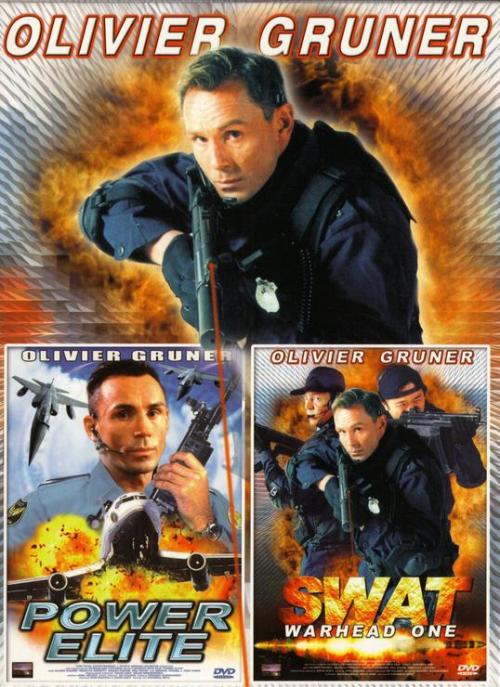
We know Power Elite and SWAT: Warhead One were shot at about the same time, with roughly the same cast and crew. Both movies seem like they have undergone a lot of rewriting (in SWAT, Mel Novak’s character is oddly well-informed about quite everything, and keeps explaining the plot to Olivier Gruner – and therefore to the audience!). To what extent did the movies, as we know them, changed from the original screenplays you wrote?
Yes, they were shot simultaneously. I think Power Elite is closer to the screenplay I had written, most of it is mine, while SWAT: Warhead One was almost brand new to me. I was lucky to get the byline. Things often change a great deal on the set, and also in the editing room.
Gerald Okamura did a wonderful job, he did something that was very much against his type: he had little glasses and was talking up high, rather than talk with his famous, deep martial artist voice!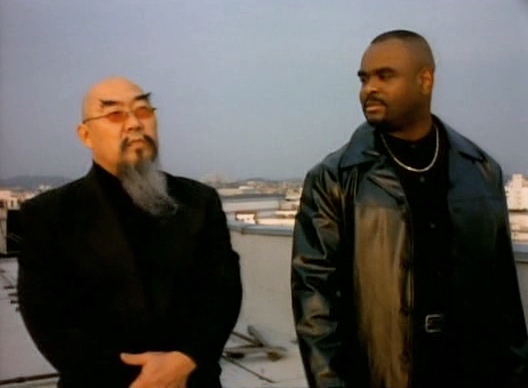 Gerald Okamura and Ron Hall in SWAT: Warhead One (2005).
Gerald Okamura and Ron Hall in SWAT: Warhead One (2005).
Olivier Gruner was really very good, but he had to keep straight which story he was telling. He kept asking « Where are we? What are we doing? What's happening here? »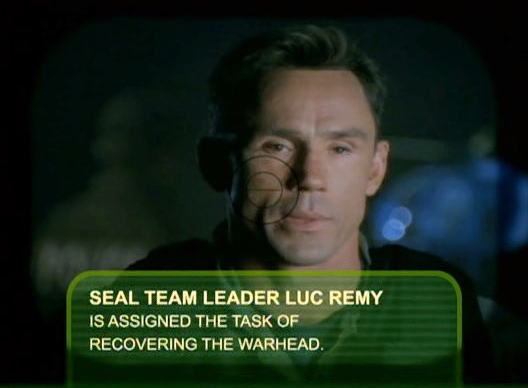 Olivier Gruner.
Olivier Gruner.
And regarding Mel explaining the plot, please don't cause trouble [laughing], the narration is one way people can somehow solve plot holes! For screen writers and movie-makers it’s a great device, don't mess with it!
Back when we interviewed him, Mel Novak told us about his close relationship with Cine Excel and David Huey. He acted in many of their films and co-producing at least one. Was Mel Novak just a regular cast, or did he play a more important role in the company?
No, he was exactly as you describe it. He was a well-known star that David knew and had access to. And Mel was into it, he was into low-budget, he was into coming down to the garage, saying a few lines. Of course he didn’t want to be embarrassed, he didn't want to do bad work. And if you treated him well, he would come back again. David knew that Mel was open to work in Cine Excel, so I think he turned to Mel a lot. Mel did have credits and did elevate the films for more credibility on the market, so it was an advantage to know Mel.
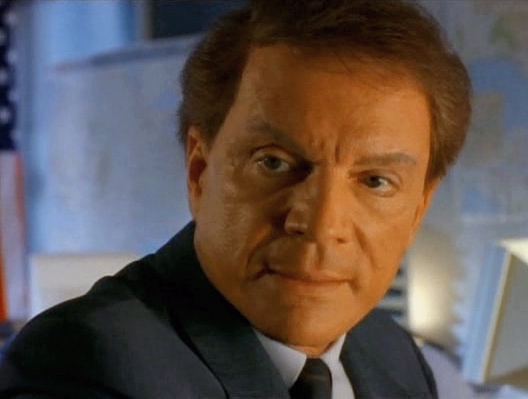
In Cine Excel films, the crew members were often filling bit parts too. You are an actor yourself, and yet you never appeared in a single one of these films. Any reason for that?
Because Cine Excel films were non-union, and I was a SAG actor. I just did not want to get caught doing it, so I declined.
We suspect "Carribou Seto" is a pseudonym of David Huey...
Yes, Carribou was the name of his cat!
[laughs] ...any idea why he sometimes used an alias?
I think it’s because he just didn't want to see his name so much in the credits, like « Cinematographer: David Huey, Writer: David Huey, Executive Producer: David Huey » etc. I think he wanted to break it up.
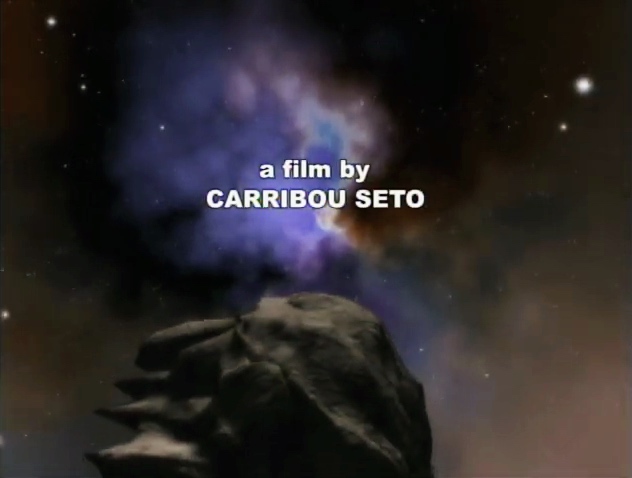
David Huey seems like a polarizing character: some people describe him as a nice, friendly guy, while others told us he was a shrewd manipulator and greedy businessman. Some feel grateful for the opportunities he gave them, while others feel cheated. It’s a bit hard to see where the truth lies. Where is your truth?
I owe David Huey my professional experience in movie-making as a writer, producer, and director.
David was an excellent Director of photography. At the time I met him, he worked on commercials, and was doing these low-budget films on the side [Nanarland: David Huey is credited as cinematographer on films like Reactor, Outlaw Force or Twisted Justice]. He worked so much, there are stories of him falling asleep during production meetings for his commercial jobs. He then went from working as a D.O.P. on commercials and low-budgets films, to being executive producer of low-budget films.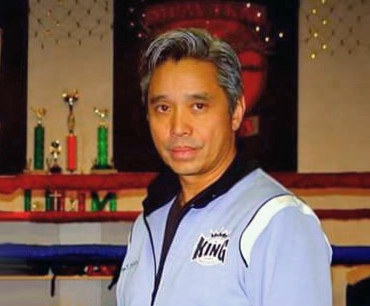 David Huey.
David Huey.
He was a very inventive person. On the set, I saw him use a regular fan, with large plastic blades, and they were spinning and he shot lights through it, and suddenly you had texture, you had mood, and the actors just had to do the work. I watched him take three large cardboard tubes – they were perhaps a yard or 6 feet in diameter – and in any given film he would use those tubes. In a movie, they became tunnels actors would crawl through, in another movie they became pylons or columns like underneath the highway, another time they were used for backdrops. He was tremendously resourceful.
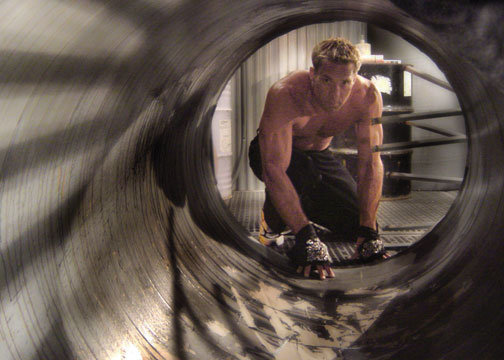 Tubes to crawl through in Reptilicant...
Tubes to crawl through in Reptilicant...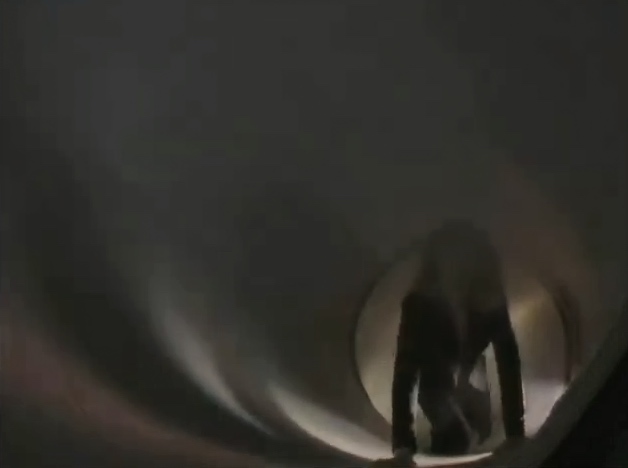
...or in GiAnts.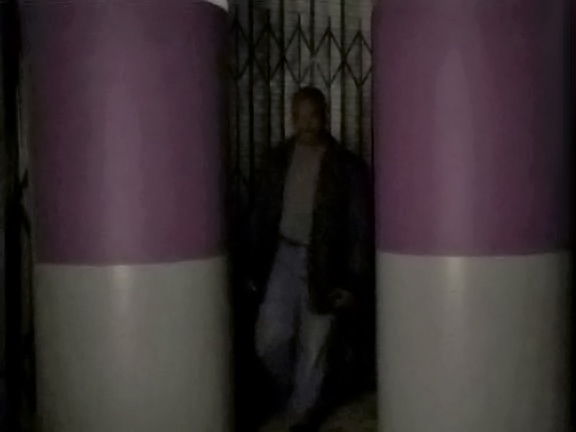 Tubes to make an entrance out of nowhere in Vampire Assassin.
Tubes to make an entrance out of nowhere in Vampire Assassin.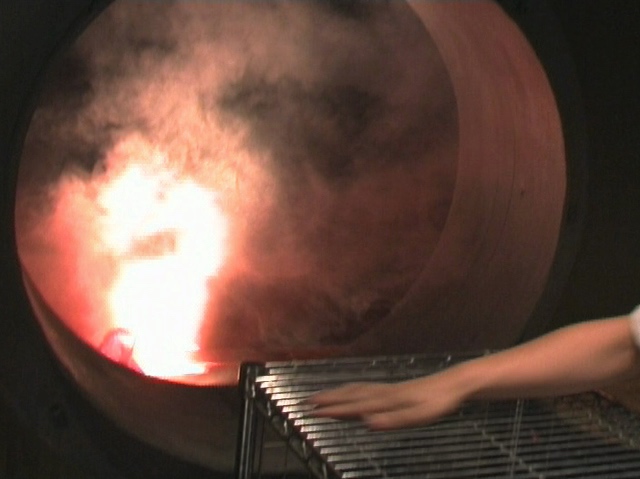 Tubes to make an incinerator in The Abominable.
Tubes to make an incinerator in The Abominable.
For Reptilicant, David went to one of these Alcatraz Tours, where tourists can cruise to the island to visit the prison. He took his camera, and during the boat trip his girlfriend would sit in the front, and he would pretend to shoot her. But of course he wasn’t: he was making shots of Alcatraz he could use in Reptilicant! It was really low-budget, guerrilla-style moviemaking. If you’re going to steal, you can’t be slow, you must be fast. He taught me all that.
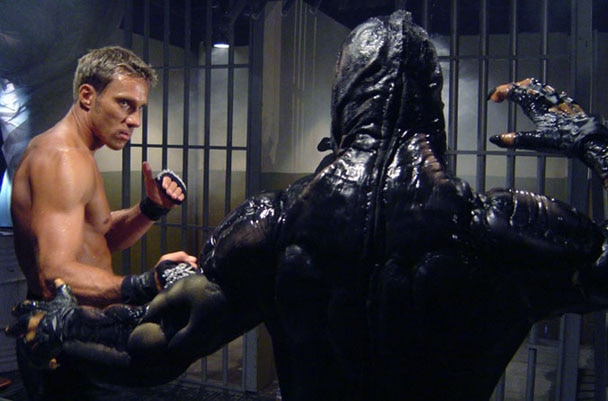
I always wished David would make a film that would be close to his heart, something more personal. During this period of time in his production company, he was largely a filmmaker for hire, but he had such skills. He had movie-making abilities – production, camera work, storyline – he had a very high level of all that. There was a great movie to be made, even at Cine Excel’s, but for his own reason he wasn’t participating in that. He seemed to prefer being an executive producer, and letting other people do that work for him.
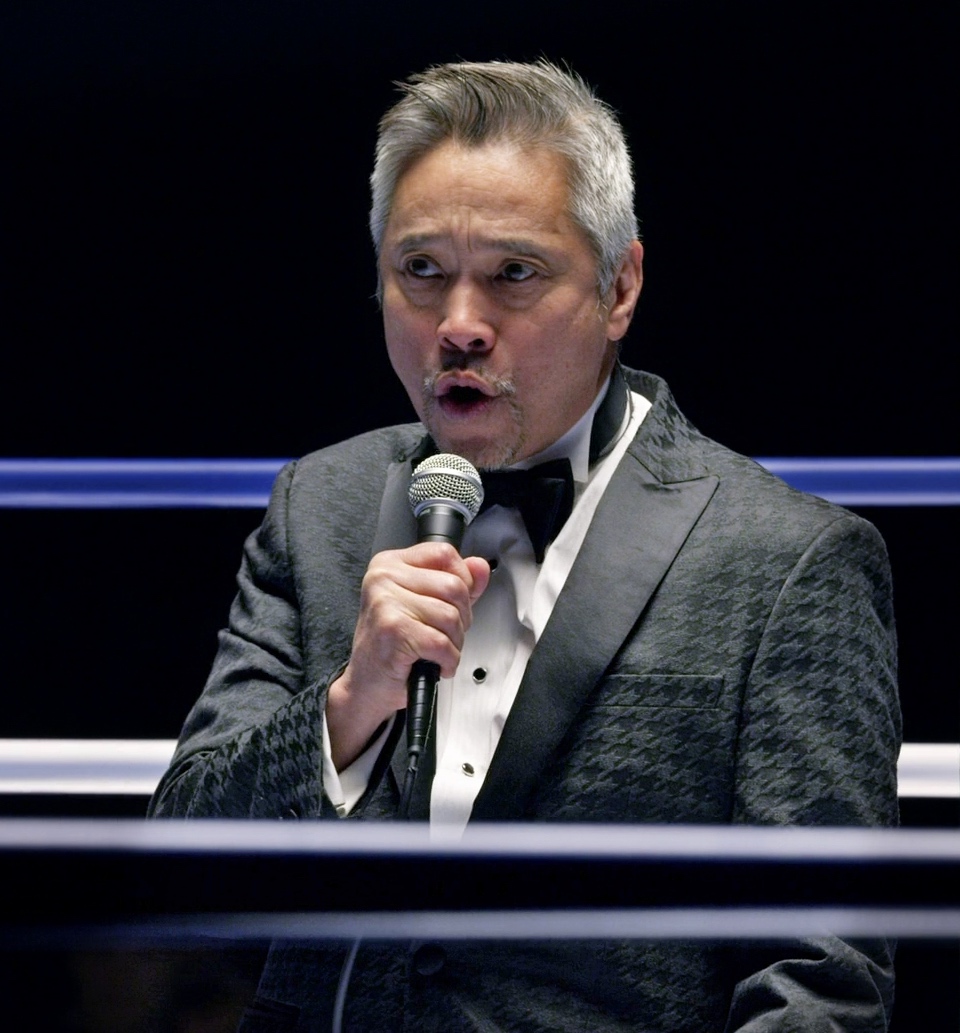 David Huey as a boxing match announcer in the "Knockout" episode of the S.W.A.T. TV series, aired in 2020.
David Huey as a boxing match announcer in the "Knockout" episode of the S.W.A.T. TV series, aired in 2020.
One day I gave David a book about James Wong Howe [Nanarland: Oscar-winning Chinese American cinematographer who made around 150 films in Hollywood between 1920 and 1975], because my hope was that his aspirations would elevate. But people do what they want to do, and seek the level that they want to seek. Cine Excel made a lot of low-budgets films, and maybe he liked the challenge of creating full length feature movies with very, very limited budget. But his participation in such things was not there. I would have liked him to do that, I would have liked him to be the director of it, and make something good, because I think he had the skills for it.
Three Cine Excel films made it to the French market, others were released in Japan, in Russia… What were the market opportunities for these movies?
I once went to the American Film Market and we had our… [long pause] humble offerings, next to people who had budgets a hundred or a thousand times higher than ours. And you look at what they have to offer, and then you look at what you have to offer, and you can feel very inferior very quickly. For a very sophisticated audience that is used to Star Wars-level action adventure, they’re not… well, they’re not interested. However, if it’s just to fill content, and you can sell it to some place like Yugoslavia or Bangkok, it will do fine. And in that world, there is a market. If you can sell it to Turkey, well good enough! Wherever you can, it’s good enough to sell and to be seen.
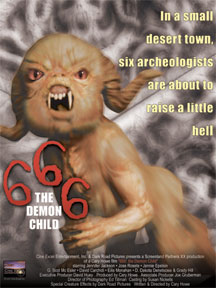
You know, Cine Excel sold movies I thought could never be sold. Have you seen 666: The Demon Child? Think of Alien in a Winnebago. Its director, Cary Howe, was immensely talented as an artist sculptor – I looked at his work and I thought Why aren't you making fine art? Look at the quality of this! But he works special effects in movies, and he had this idea for the demon child, and he created the demon for the movie and, well… it was again a completely low-budget film, with like four or five actors… but it got sold! And I kept saying « why did they want to buy that? » And I guess the answer is simply because horror is a saleable genre. [Nanarland: Cary Howe, who wrote, produced and directed 666: The Demon Child for Cine Excel, has the unique privilege to have worked on the special effects of both Future War and The Lord of the Rings: The Fellowship of the Ring]
Can Cine Excel be considered successful? On average, did the films make a profit?
In terms of making its money back, I don't know. In terms of its production, it's been largely, uh, maybe not profitable but successful. These movies provided a lot of work for us. For the time that I was associated with Cine Excel, I know we were very busy, it seems we were working like back to back in projects. But I think David left the low-budget film-making business when, at some point, he saw that one of his projects ended up on Youtube. This is speculation on my part, but I think suddenly he felt like everything that he owned was vulnerable. He realized he could make a movie, and then somebody would hack into whatever he's got, and it would be ending up over there, and he would lose control of his product. So, it stopped being profitable. It must have been meaningful for him, since he stopped doing it.
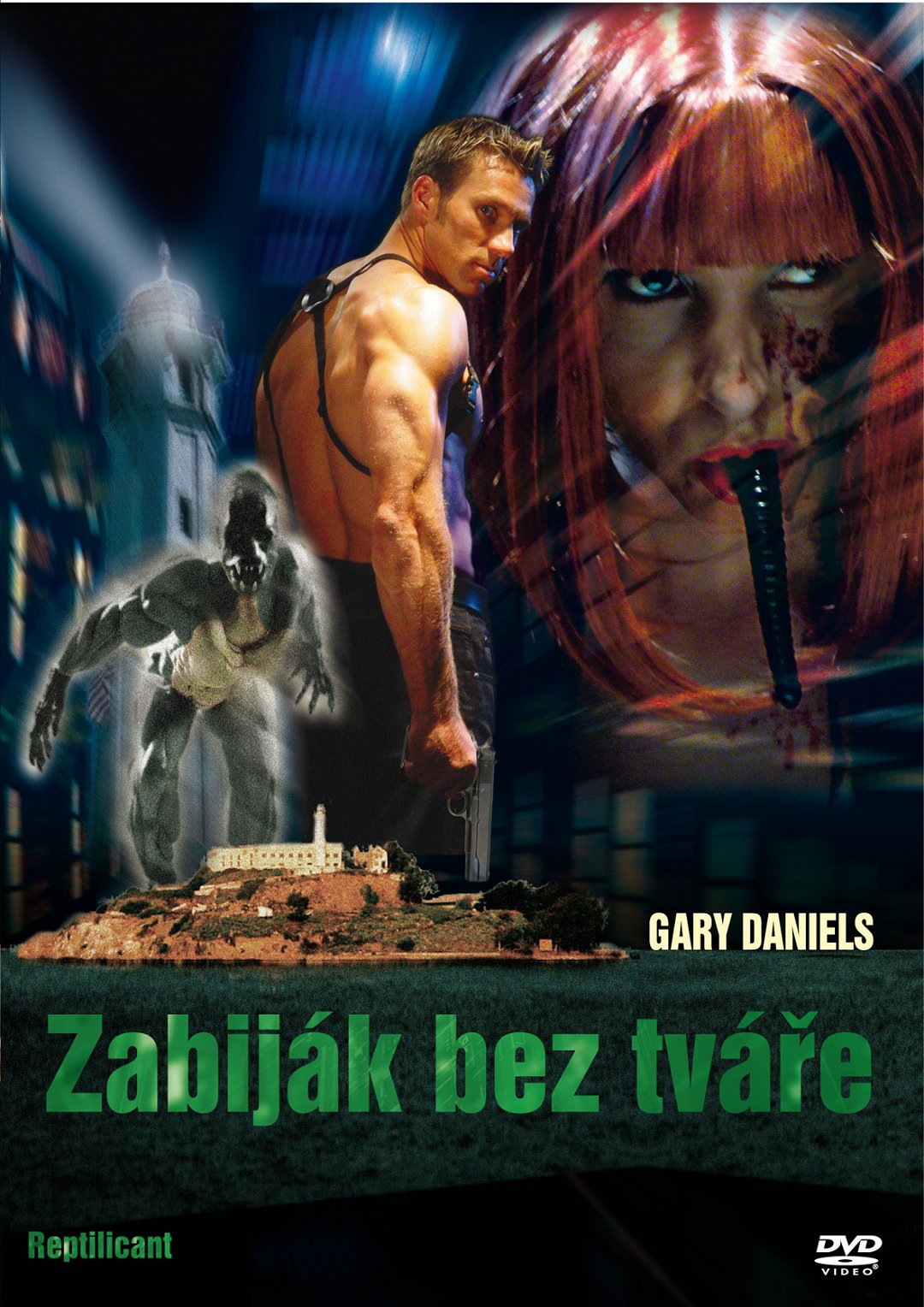 Czech DVD cover for Reptilicant (2006).
Czech DVD cover for Reptilicant (2006).
With the benefit of hindsight, how do you feel about your experience with Cine Excel?
I think I learned an enormous amount. I learned about organization, I learned about the value of paperwork, I learned what movie-making at that level is like – and that was as low-budget as you can get. I learned that in the end, you just do the best you can with what you have.
I also learned that because there was no money, there was only good manners and persuasion. Because if you treat somebody really bad, you won't see them again, they have no reason to come back. You just can’t yell at somebody who’s working for free. So, we always tried to treat the actors well. Some were very skilled, had a love for performance, but for whatever reason never found their way into the business. I think that as long as we treated them well and fed them, they were happy to participate in our movies. At whatever level we had.
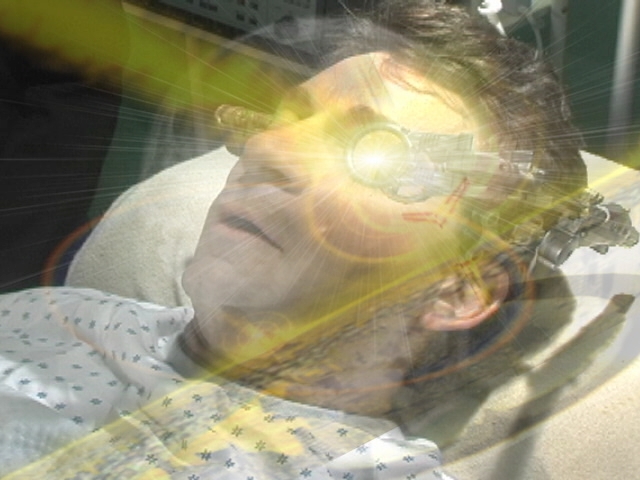 A shot from the elusive Internetrix, Cine Excel’s answer to The Matrix. The movie was reportedly completed but apparently never released.
A shot from the elusive Internetrix, Cine Excel’s answer to The Matrix. The movie was reportedly completed but apparently never released.
I have directed outside Cine Excel, but my appreciation of that « get it in quickly, get it in fast » style, and of making the best of the little you have, came from Cine Excel. The idea of making so-called low-budget films back when we did it, that was a lot of fun. At least when you know you can sell what you've got. Back then I was studying Roger Corman, and the spine to his endeavors was he knew where he could sell those movies. But the spine for movie-making at this level, now in 2021? I don't know what it is, especially when you have Youtube. Because why pay when you can get it for free? The Internet has thrown in a new level, a new dynamic that.. well, I’m not sure how that works. I am very curious about it.
Thank you so much for your time and kindness Dom!
Oh well you’re welcome! You know, after I left David I went back to school, got my MFA and then ended up teaching, so Cine Excel was something out there, in the past… but there you are Nanarland, so I appreciate and I am grateful for your interest.
